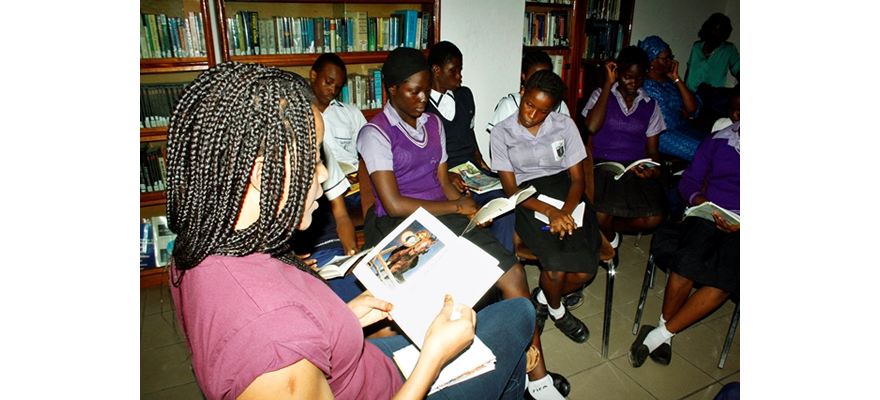Of Animal Rights and Independent Minds: My ZODML Reading Programme Experience
When my colleague Chiagozi handed me the book I was to discuss with senior secondary school students at the final ZODML reading programme session of the year, I was confused. "I thought the students were reading Excuse Me?" "That was the original plan, but we weren't able to find enough copies to buy. So we're reading this instead." I stared at the image of a young red-headed girl wearing a long dress and a bonnet, and realised I had my work cut out for me. How was I going to get a group of Nigerian teenagers to enthusiastically discuss life in colonial America from the perspective of an 9 year-old?
I have attended many of ZODML's reading programme sessions during my time as an employee here, mostly to make notes and interview authors for blog posts and to take photos to post on our Facebook page in my role as website manager. I have been lucky to watch the magic of books unfold in front of my eyes as participants connect with writers such as JP Clark and Ifeoma Okoye and eagerly throw themselves into debates about characters' motivations and a story's ending. Moving from the comfortable position of observer to leading the conversation - especially with a book that didn't look too inspiring, given my audience - was disconcerting, to say the least. But I was glad to have the opportunity to get involved more directly with one of our projects - not to mention getting a break from my computer screen. And so I began to read with hopes of finding something to hold the students' interest for at least an hour. The book - entitled Meet Felicity - is the first in a series of six written by Valerie Tripp for the American Girls series. American Girls was created with the intention of "[captivating] readers with stories of heart, hope, and history" as well as instilling values such as "the importance of family and friends, compassion, responsibility, and forgiveness." Girls from different eras, class, and race backgrounds, are the subject of the books. Felicity's books are set in 1774, during the American Revolution which saw the country become independent from Britain. A tomboy with a love for horses, she lives in the city of Williamsburg and spends the majority of the book trying to free a mare she names Penny from her cold-hearted and violent owner Mr Jiggy Nye. I enjoyed the story, but I worried that the students might not find it challenging enough - and that any boys would be less than enthused at the prospect of discussing anything remotely "girly". Nevertheless, I jotted down a few questions I hoped would keep the room from being silent (and decided to ask what each student's favourite food was at the beginning as an icebreaker, so that I could at least get a few laughs in early). Thankfully, my fears were misplaced: the brilliant group from Ilado Community Senior High School and Akande Dahunsi Memorial Senior School who visited the Community Library - like so many others before them - blew me away with their insightful comments and strident opinions. Although a number were upfront about not liking the book ("it was too boring"), they still expressed nuanced opinions, from the main character ("I liked Felicity - she had real presence of mind and she wasn't afraid to stand up for what she believed in"; "I thought she was very bold in how she spoke to adults!") to whether or not Jiggy Nye had the right to kill Penny if he so desired ("Even if you own an animal, it still has rights"). Some came armed with knowledge about America's colonial history, while others were able to quickly compare and contrast it with Nigeria's. To shed light on another aspect of the era, I told them the story of the Zong ship, and they were quick to discuss the similar issues of liberty and rights linking that story to Penny and Felicity's. We were so wrapped up in this topic that I was sad when Chiagozi signalled that we were running out of time, but I was glad to have the chance to read the ending of the story (their favourite part) aloud to the group. Before the end of the session, I was asked to select the best three extensions to Felicity's story written by the students. I was moved by how their writing was able to capture the tone of the story, both in terms of language and its message of personal responsibility and staying true to your ideals. Although it was tough to narrow down the final winners, I thought that Godspower Odughu, Martins Albert, and Dominic Jombo did a particularly admirable job (even though Martins was one of those who said they didn't like the book!). A special thank you went to Dominic and Patience Ezekiel for saying the opening prayer and giving the vote of thanks respectively.
With the three top writers, ZODML CEO Ifeoma Esiri, and ZODML staff Comfort Olukogbon
All of the session's participants are now members of the ZODML Community Library, and I hope to see them again reading and borrowing - perhaps even another book from the American Girls series (as we also learned in the session not to judge a book by its cover)!





